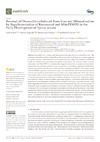Identificador persistente para citar o vincular este elemento:
https://accedacris.ulpgc.es/jspui/handle/10553/114135
| Título: | Reversal of Doxorubicin-Induced Bone Loss and Mineralization by Supplementation of Resveratrol and MitoTEMPO in the Early Development of Sparus aurata | Autores/as: | Poudel, Sunil Izquierdo López, María Soledad Cancela, Maria Leonor Gavaia, Paulo J. |
Clasificación UNESCO: | 310502 Piscicultura 310406 Nutrición |
Palabras clave: | Bone Deformities Doxorubicin Mineralization Mitotempo Oxidative Stress, et al. |
Fecha de publicación: | 2022 | Publicación seriada: | Nutrients | Resumen: | Doxorubicin is a widely used chemotherapeutic drug known to induce bone loss. The mechanism behind doxorubicin-mediated bone loss is unclear, but oxidative stress has been suggested as a potential cause. Antioxidants that can counteract the toxic effect of doxorubicin on the bone would be helpful for the prevention of secondary osteoporosis. We used resveratrol, a natural antioxidant, and MitoTEMPO, a mitochondria-targeted antioxidant, to counteract doxorubicin-induced bone loss and mineralization on Sparus aurata larvae. Doxorubicin supplemented Microdiets increased bone deformities, decreased mineralization, and lipid peroxidation, whereas Resveratrol and MitoTEMPO supplemented microdiets improved mineralization, decreased bone deformities, and reversed the effects of doxorubicin in vivo and in vitro, using osteoblastic VSa13 cells. Partial Least-Squares Discriminant Analysis highlighted differences between groups on the distribution of skeletal anomalies and mineralization of skeleton elements. Calcium and Phosphorus content was negatively affected in the doxorubicin supplemented group. Doxorubicin reduced the mRNA expression of antioxidant genes, including catalase, glutathione peroxidase 1, superoxide dismutase 1, and hsp90 suggesting that ROS are central for Doxorubicin-induced bone loss. The mRNA expression of antioxidant genes was significantly increased on resveratrol alone or combined treatment. The length of intestinal villi was increased in response to antioxidants and reduced on doxorubicin. Antioxidant supplements effectively prevent bone deformities and mineralization defects, increase antioxidant response and reverse doxorubicin-induced effects on bone anomalies, mineralization, and oxidative stress. A combined treatment of doxorubicin and antioxidants was beneficial in fish larvae and showed the potential for use in preventing Doxorubicin-induced bone impairment. | URI: | https://accedacris.ulpgc.es/handle/10553/114135 | ISSN: | 2072-6643 | DOI: | 10.3390/nu14061154 | Fuente: | Nutrients [EISSN 2072-6643], v. 14 (6), (Marzo 2022) |
| Colección: | Artículos |
Citas SCOPUSTM
11
actualizado el 08-jun-2025
Citas de WEB OF SCIENCETM
Citations
11
actualizado el 25-ene-2026
Visitas
299
actualizado el 15-ene-2026
Descargas
119
actualizado el 15-ene-2026
Google ScholarTM
Verifica
Altmetric
Comparte
Exporta metadatos
Los elementos en ULPGC accedaCRIS están protegidos por derechos de autor con todos los derechos reservados, a menos que se indique lo contrario.
